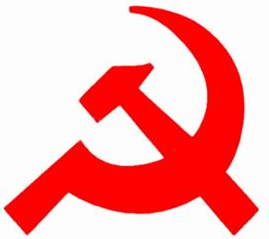Bulletin N°34 avril 2023 Chinese President Xi Jinping recently visited his Russian counterpart, Vladimir Putin.
Their meeting resulted in a joint statement that indicates a strengthening of bilateral economic ties, but also a convergence of views on the vision of the capitalist world that they promote. The leaders of these imperialist powers there affirmed their will to take their place in the inter-imperialist competition.
The strengthening of economic ties between the two countries and in the region
This meeting first served to underline the importance of trade ties between the two countries and to strengthen them.
Since the outbreak of the war in Ukraine, Russia, due to the economic sanctions of its imperialist rivals who support the Kiev regime, has reoriented its economy, in particular towards Asia and more specifically towards China, which, in exchange, has substantially increased its imports of Russian hydrocarbons. Thus, trade between the two countries increased by 34% over the year, reaching a record amount of 190 billion dollars in 2022. “Russian companies are able to meet China's growing demand for energy. », Vladimir Putin said yesterday during his talks with Xi Jinping in the Kremlin. The objective is to deliver to China at least 98 billion cubic meters of Russian gas and 100 million tons of Russian LNG by 2030.
Moscow was also able to offset its program of importing goods from the countries of the EU by finding a market in China, particularly for automobiles and technology.
The joint declaration, published at the end of the Chinese president's visit to Moscow, mentions a "closer energy partnership" , but also the continuation of cooperation between the two countries "in civil aeronautical construction, automobile construction, shipbuilding, metallurgy and other fields of mutual interest”.
In this context, the emphasis is on the development of Eurasia, with the major projects that China wants to carry out in the region, such as the "silk road" . This project, baptized "A belt, a road"consists of creating five corridors, a kind of big pipe including railways and highways, linking China, on the one hand to Southeast Asia from Kunming, the capital of Yunnan, to Malaysia and Singapore via Laos, to the Bay of Bengal via Burma, on the other hand to Central Asia from Kashgar to Pakistan and Gwadar Port, from Khorgos to Kazakhstan and Caspian Sea countries. These corridors have the dual objective of favoring border areas and opening up new markets for Chinese products, but also of multiplying the points of exchange and of being able to free ourselves, if necessary, of the ports on the Pacific coast. However, the joint declaration promotes "the parallel and coordinated development of the 'Belt and Road' and the ', as well as the process of bilateral and multilateral integration for the benefit of the peoples of Asia and Europe”. It also insists on the development of the three-way partnership with Mongolia, notably through a new gas pipeline project.
Finally, the two countries will also develop their military cooperation, particularly in “the prevention of 'color revolutions', transnational organized crime, economic crime and drug-related crime. Thus , the two countries will regularly organize joint maritime and air cooperation.
The strengthening of an economic bloc rivaling that around the USA
But the document also claims a new world, multipolar, opposed to the unipolar world with a single imperialist power in control, the USA.
The introduction to part V of the final document is very enlightening on this subject: the two countries"reaffirm their commitment to firmly defend the international system with the United Nations at its center, the international order based on international law and the fundamental norms of international relations based on the purposes and principles of the Charter of the United Nations, and to oppose all forms of hegemonism, unilateralism and power politics, cold war thinking, confrontation between camps and the creation of inner circles targeting specific countries. ». But it is indeed about trade, since the text continues by indicating the common position of the two States in favor of "the construction of an open world economy, the maintenance of the multilateral trading system with the World Trade Organization in its centre, promoting the liberalization and facilitation of trade and investment, calling for an open, equitable, just and non-discriminatory development environment, opposing unilateralism and protectionist acts, and l opposition to "the building of walls and barriers" and "the creation of an environment conducive to investment". ». This multipolar world is indeed that of a world capitalist system at its imperialist stage, dominating the world and where competing blocs clash.
The leaders of the two countries highlight the economic cooperation organizations in which they participate: the Shanghai Cooperation Organization (with Kazakhstan, Kyrgyzstan, Tajikistan, Uzbekistan, India, Pakistan and Iran) and the BRICS (with Brazil, India and South Africa).
This multipolar world therefore consists in organizing a bloc of capitalist powers opposed to the bloc formed around the dominant imperialist power, with its "second knives"imperialists, such as Great Britain, France, Germany or Japan. The stated objective of opposing the confrontation between the camps is, of course, illusory, as long as the capitalist system persists, and as long as the leaders of these two great countries show no intention of leaving it. In fact, the only problem in this world for Putin and Xi is not the imperialist stage but the US as a competing power which they "urge to stop undermining international and regional security and strategic stability. world in order to maintain their own unilateral military superiority. » .
For the Revolutionary Communist Party, these concepts of unipolar and multipolar world are decoys. The reality is that we live in a world totally or almost won over to capitalism, which means sharpening conflicts between powers, the idea of settling differences through war and keeping peoples under the yoke of exploitation. It is not a multipolar world that we need, but a world free of capitalism, a world without imperialist power, neither the United States and its partners, nor their imperialist rivals.


